Artificial intelligence (AI) is making waves across the music industry. A surge of AI tools and music generators is catalyzing the growth of AI-powered music by employing machine learning, neural networks, and generative AI in platforms accessible to the multitudes. One such example is Mubert AI (or Mubert). Mubert is a versatile platform that serves those seeking to create bespoke music tailored to their taste. In this blog post, we’ll cover how Mubert works, explore the potential of its tools, review its key features, and more to help you decide if it is the right tool for you.
Why Use AI to Create Music?
Subscribe To Our Youtube Channel
AI is a game-changer for aspiring musicians. It addresses the limitations of missing instrument players or vocalists, effortlessly filling these gaps. Besides the time and money put into studio sessions, mixing and mastering can be overwhelming. But with Mubert and other popular AI audio tools like LANDR, Soundful, and Beatbot, these hefty expenses are a thing of the past. Made affordable with a user-friendly monthly subscription, AI is now indispensable in the music booth. By tapping into AI, you can explore unfamiliar music genres, interact with distinctive soundscapes, and get inspired by ideas beyond your immediate setting, making it an excellent tool for creativity and collaboration.
What is Mubert AI?

Mubert AI is a platform for creating music with AI. It offers a suite of AI music tools that facilitate music creation, and it provides royalty-free music, music program extensions, and more, all bolstered by artificial intelligence.
Mubert AI is designed to foster a collaborative approach towards music creation. With Mubert Render, users can design an audio track tailored to their preferences regarding length, genre, and mood – an unmatched level of musical customization. But it doesn’t end there. Additionally, you can explore Mubert’s comprehensive, excellently organized library of music tracks meticulously curated by the Mubert team. With over 100 genres and a host of attributes to assist you in finding your ideal tracks, Mubert significantly simplifies the creative process.
Mubert’s philosophy is firmly rooted in a fair and balanced amalgamation of human musicians and generative AI. When you create, use, or purchase a track from Mubert, you can know that a real, live human musician will be appropriately compensated for their hard work.
Mubert AI Products & Tools
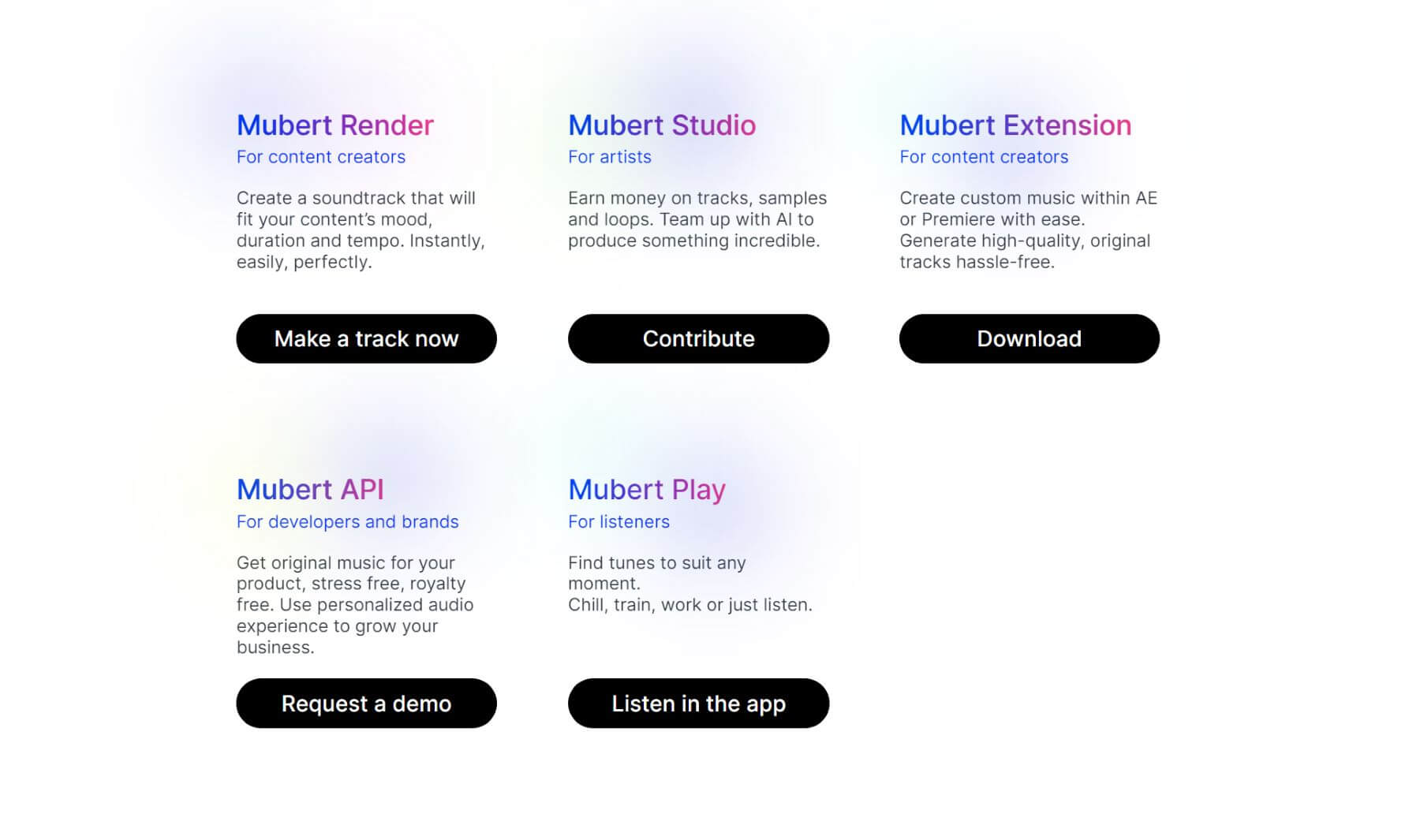
Mubert AI offers a vast library of products and tools that can be utilized to create, use, and monetize music. Regardless of your business, brand, or blog, Mubert has a tool to help you incorporate AI music into your final product. Here is an overview of the tools offered and what they can do:
- Mubert Render: This popular online AI music generator creates AI music with simple text prompts. Create music based on genre, mood, key, or beat per minute using the easy-to-use Mubert Render interface and your imagination. You can also become a featured artist on their site so users can explore your music.
- Mubert Extension: Integrate Mubert with your Adobe After Effects and Adobe Premiere installations, creating original music as you edit. Stop searching for royalty-free music libraries for tracks; make your own via the Mubert Extension in your video and audio editor.
- Mubert Studio (Beta): Collaboratively create music with AI and earn money while your music samples are shared globally. The sleek Mubert Studio allows you to create and share your music with other producers and Mubert customers.
- Mubert API: Bring Mubert into your games, apps, and software. Mubert’s API allows you to have DMCA-safe music for your next project. Mubert’s API takes sample packs created by musicians and composes said samples into compositions your clients can enjoy, no matter where they are.
- Mubert Play: Choose from 40+ mood channels, find the perfect soundtrack for your next workout, or stay focused on your tasks with AI-generated music that is geared towards helping you focus and remain calm throughout your work day.
Mubert AI Use Cases
To give you a glimpse of what these tools can do, we’ve outlined some potential use cases for each of the tools offered by Mubert AI:
| Mubert Tool | Best For: | Example Use Cases |
|---|---|---|
| Mubert Render | Hobbyists, Beginner Creatives, Personal Blog Owners | A new YouTuber can create their own intro and outro music, without paying licensing or monthly fees. Content creators can freely use this tool to generate interesting and new background music for their Reels, TikToks, and more. |
| Mubert Extension | Producers, Editors, Designers | The hard-working producer can now create music on the fly, from their video editor. Audio engineers can save time by making the perfect track in their workspace, instead of searching websites for the perfect sound. |
| Mubert Studio | Musicians, Artists, Music Producers | Musicians and producers who want to share their music on a larger scale. Music producers who want to monetize their beats and tracks through a fair medium. |
| Mubert API | Video Game Studios, Agencies, Developers | Generate the best loops, jingles, and more for your video game, without investing thousands in musicians and studio time. Studios and game designers can generate and include original music in their apps, games, and products. |
| Mubert Play | Everyone, Music Enthusiasts | The every day listener who wants to support musicians in a fair and democratic way. People looking for music that'll help them with meditation, focus on work, or exercise better. |
| Mubert Business | Shop Owners, Brick-and-Motar Businesses & Other Public Spaces | Business owners who may be concerned about DMCA-legalities when it comes to playing music in your space. |
Now that we know which Mubert tool would work best for us, let’s learn more about the key features of this powerful AI music tool.
Key Features of Mubert Render
Mubert Render is a premier choice for AI-generated music, thanks to various standout features. These include a user-friendly interface and even an Adobe extension. Here’s a closer look at some prominent characteristics of Mubert Render:
Easy-to-Use Interface
It’s simple to create your first AI-generated audio track with Mubert Render. Let’s look around Mubert Render’s interface and see available features.
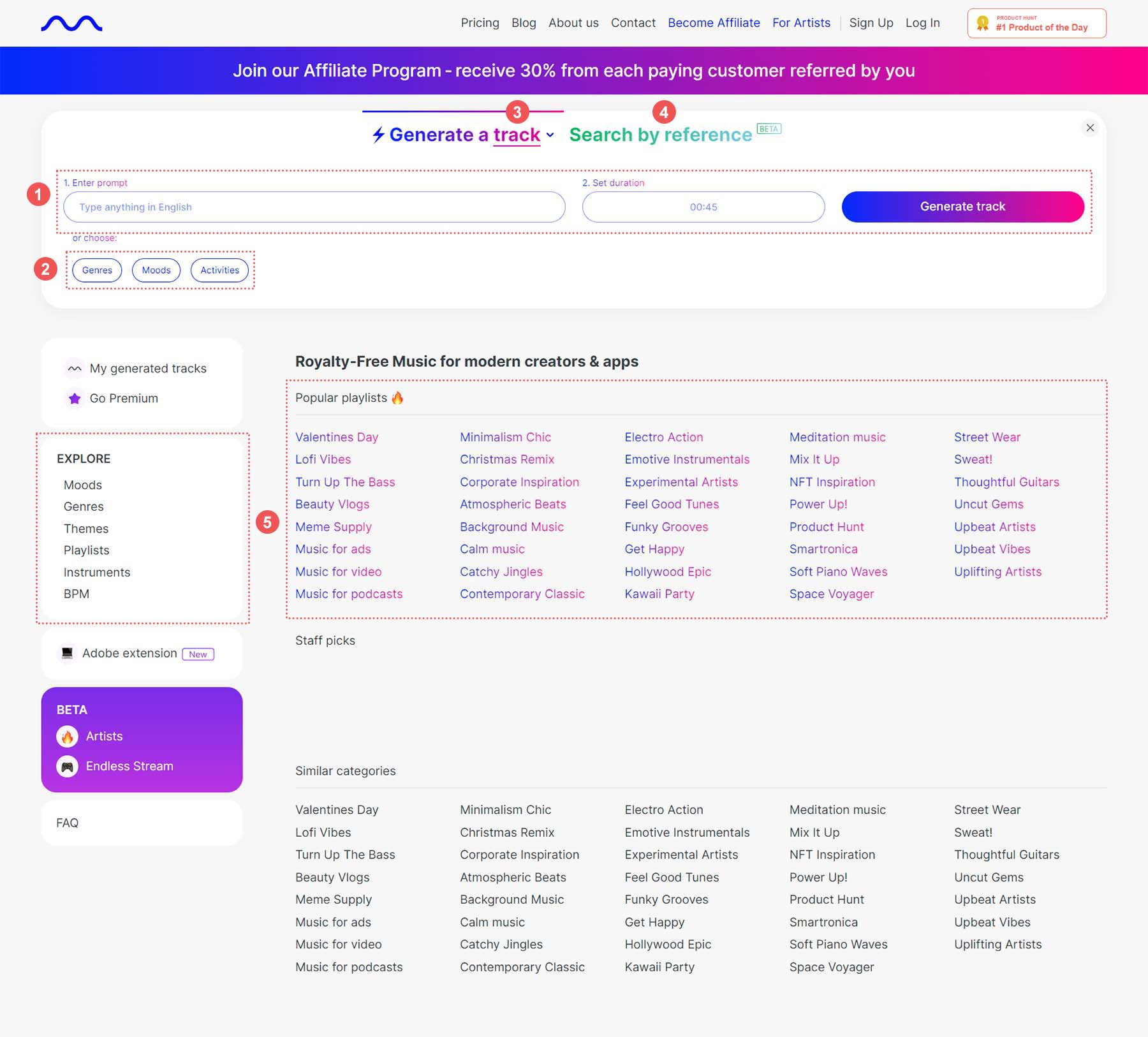
- This is where you’ll enter your text prompt to generate your music. You can be as descriptive as you’d like, adding moods, instruments, and more.
- Mubert Render allows you to pick from a long list of moods, genres, and activities that you can use to inspire your audio-making process.
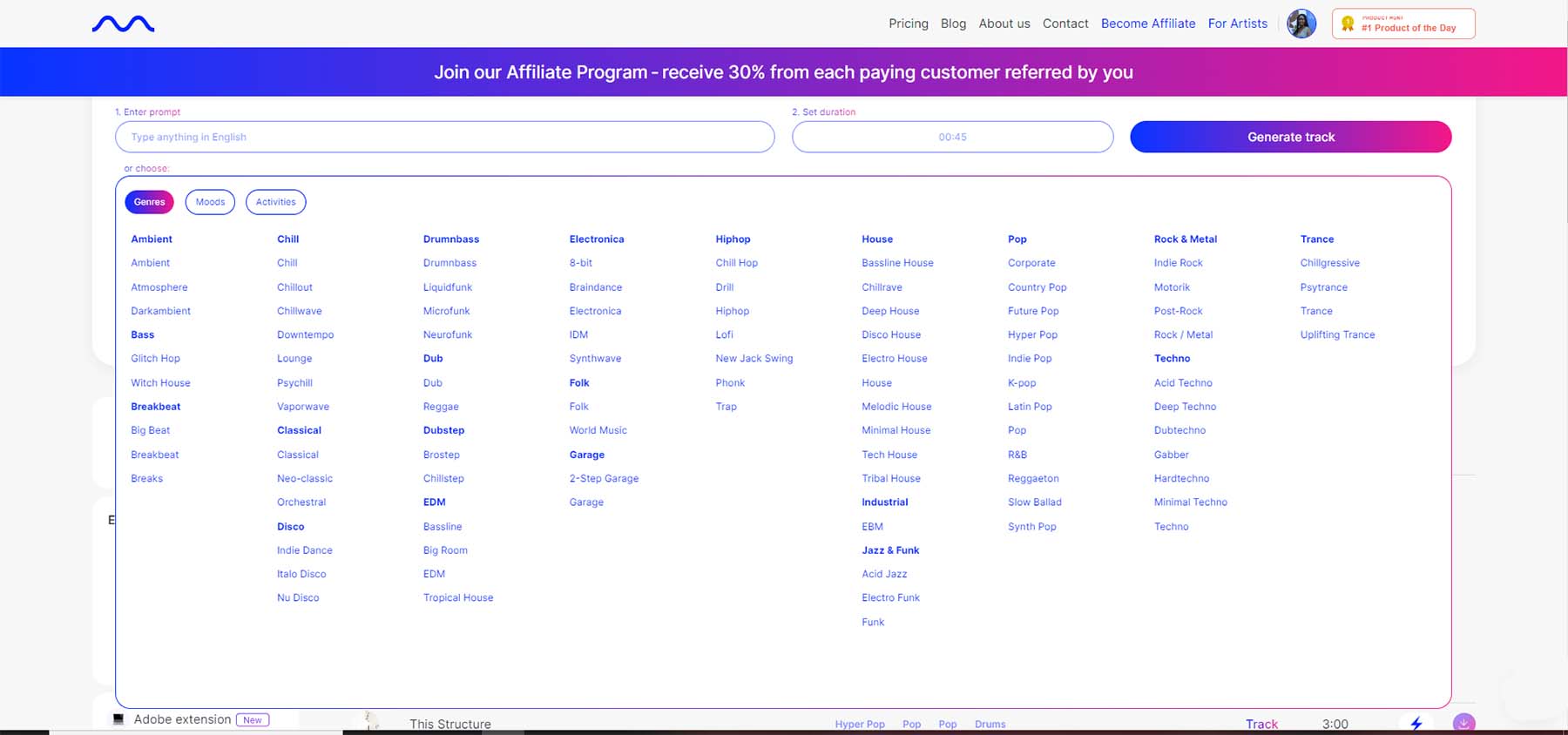
- With Mubert, you can generate tracks, loops, mixes, and jingles using AI.

- Alternatively, if there’s a song on YouTube that you’d like to use as a reference for your track, Mubert allows you to enter the URL and uses the video to inspire your music.

- Finally, Mubert provides you with numerous libraries and playlists where you can find pre-created audio tracks. These tracks can inspire your music or be downloaded and used as they are.
Seeing how simple it is to use Mubert, let’s look at its exhaustive library of AI-generated music that you can use.
Extensive Library of Royalty-Free Music
Mubert boasts a library of over one million musical elements. It houses royalty-free music created by human musicians and AI. You can search and select more than 40 playlists, 20 themes, 50 genres, and 30 moods to download and use in your projects.
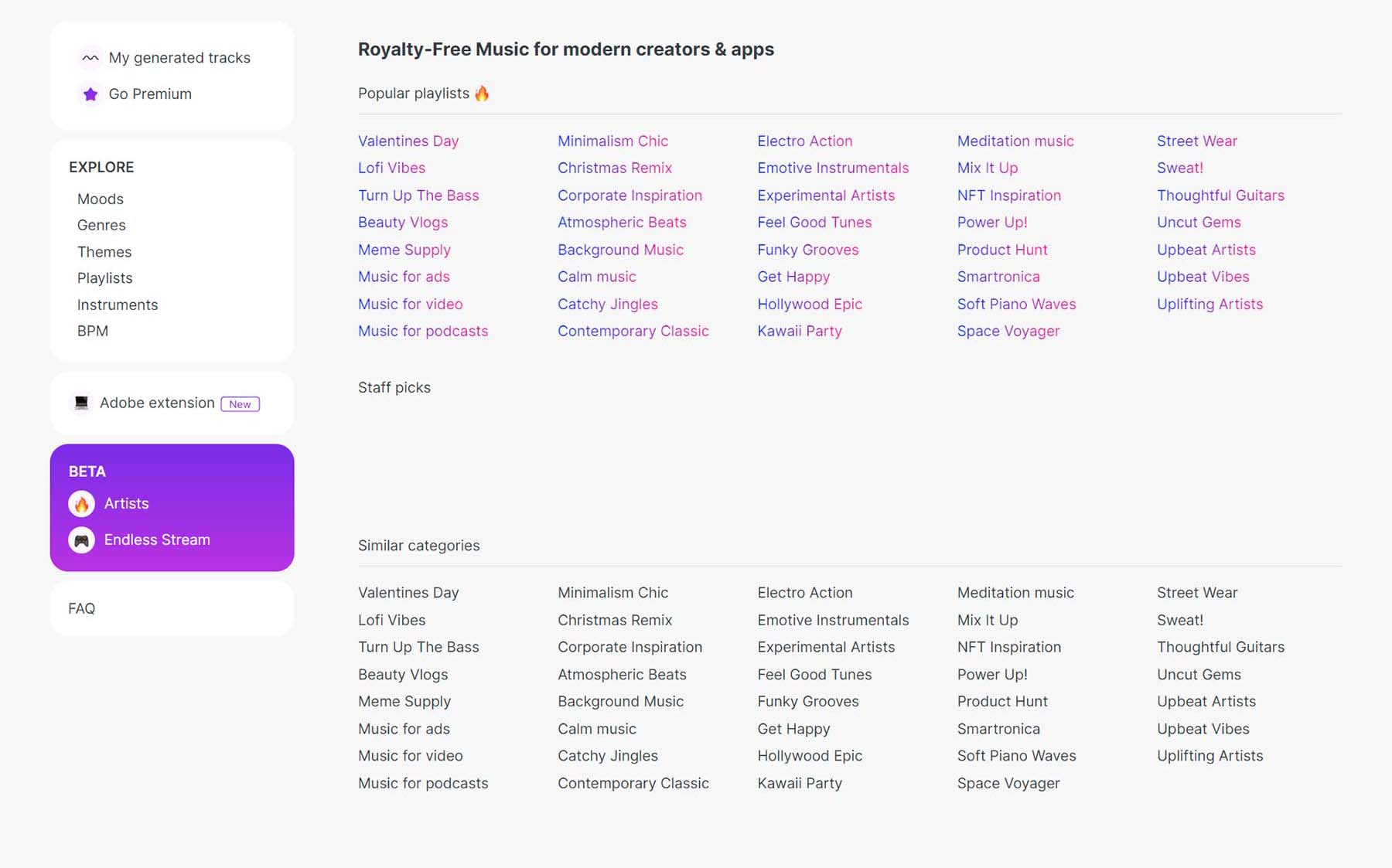
You can use the tracks within the library by clicking the download button next to the track in the library.
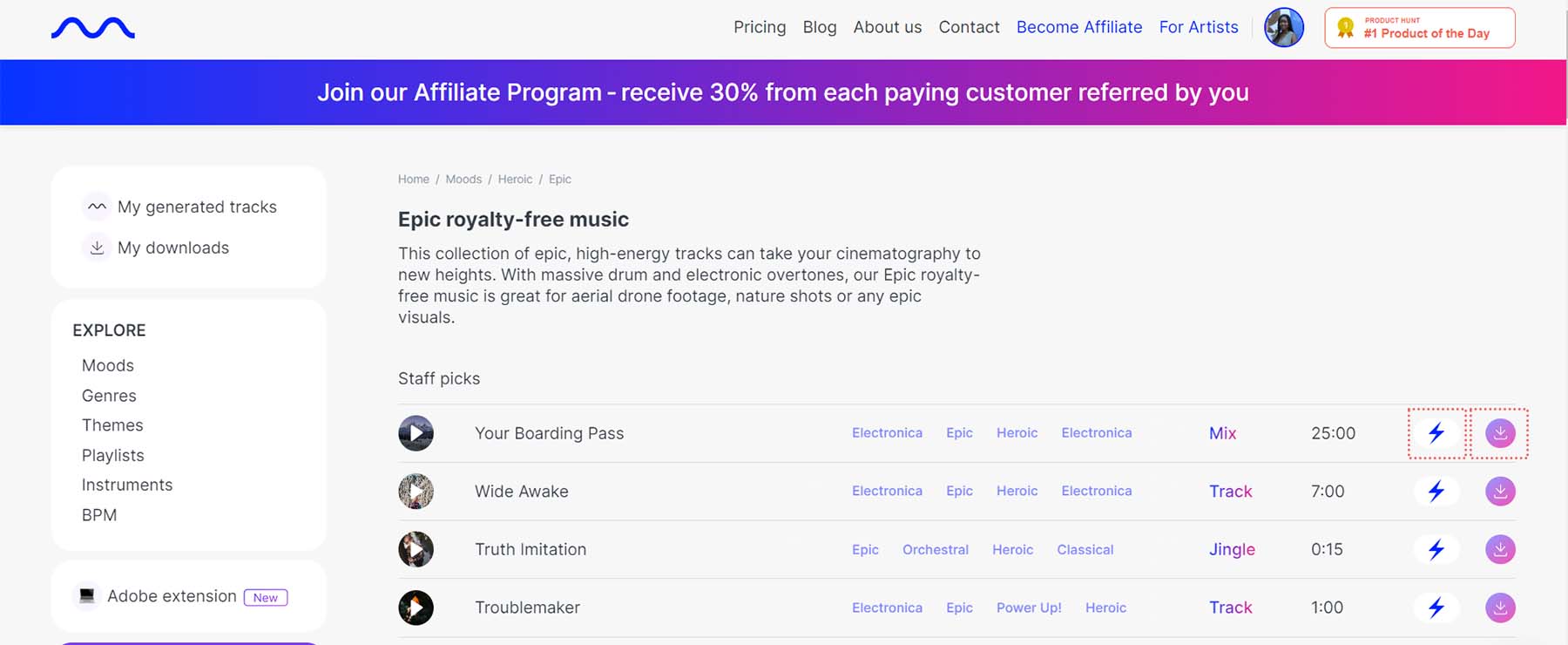
Alternatively, you can use these tracks as a starting point to generate new music with AI and your creativity. We’ll see an example below when checking out the quality of tracks created by Mubert.
High-Quality Music Generated by AI
Mubert produces high-quality music that’s anything but cartoonish, bland, or hollow. Downloaded audio is available as an MP3, and paid plans can enjoy a lossless quality of their audio. Let’s dive into a few examples of the captivating tracks you can expect from Mubert:
Example 1: Re-imagining a Track for Video Background Music
This is a track called An Airship that is a part of the Lo-Fi Vibes playlist in the Mubert library.
The following loop was a re-imagining of the An Airship track. You do this by clicking the lightning arrow next to the track in the library or after a new track has been generated.
Mubert was asked to convert the track into a loop that would work well for background music on a YouTube video or a Twitch stream. It has the essence of the original track but adds a different flair and the possibility for the track to be played on a continuous loop.
Example 2: Creating an Afrobeats Track

Here is another example prompt asking Mubert to create an Afrobeats track:
“Create an Afrobeats track. Make it sound cool and mysterious, like Burna Boy, in the key of Bb.”
We decided on the key it should be created in, the sound’s inspiration, and duration.
Mubert did a decent job of creating a track that was creatively inspired by human prompts, created by machine learning, artificial intelligence, and more. It should be noted that Mubert struggles slightly when working with newer or world music genres like Amapiano or Bhangra, so bear this in mind when creating music.
Integration with Third-Party Tools
Mubert’s extension brings AI music generation right into your studio equipment. If you use Adobe After Effects or Premiere, Mubert has an extension that you can use to generate music in your editor of choice quickly.
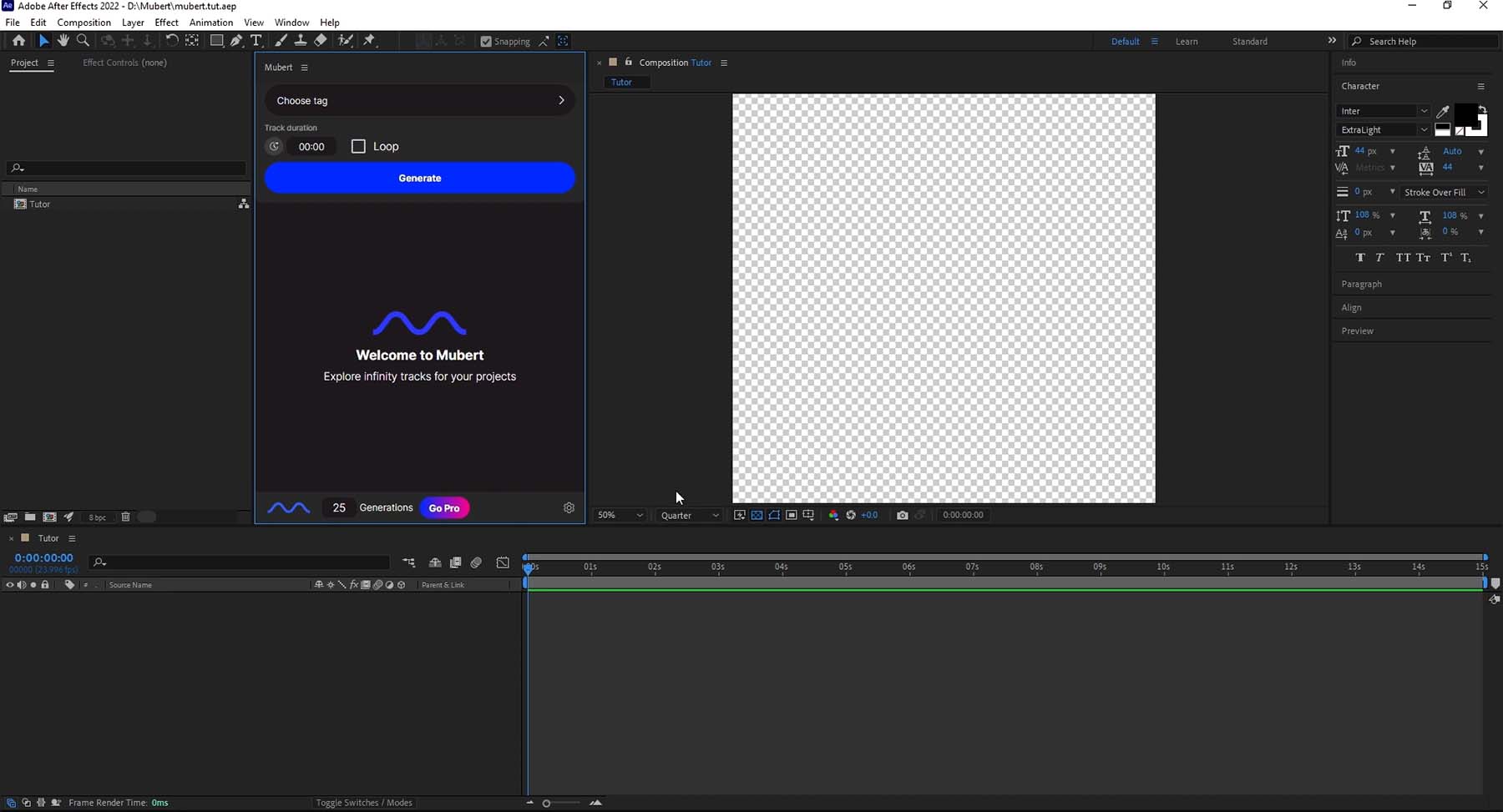
You can search the library, generate music, and then insert it directly into your timeline and artboard, ready for you to bring into your project. Reduce the search for royalty-free music and reap the rewards of total control over the music you create and use in your work.
With Mubert Studio, artists can be confident that they can monetize and receive adequate payment for their work.
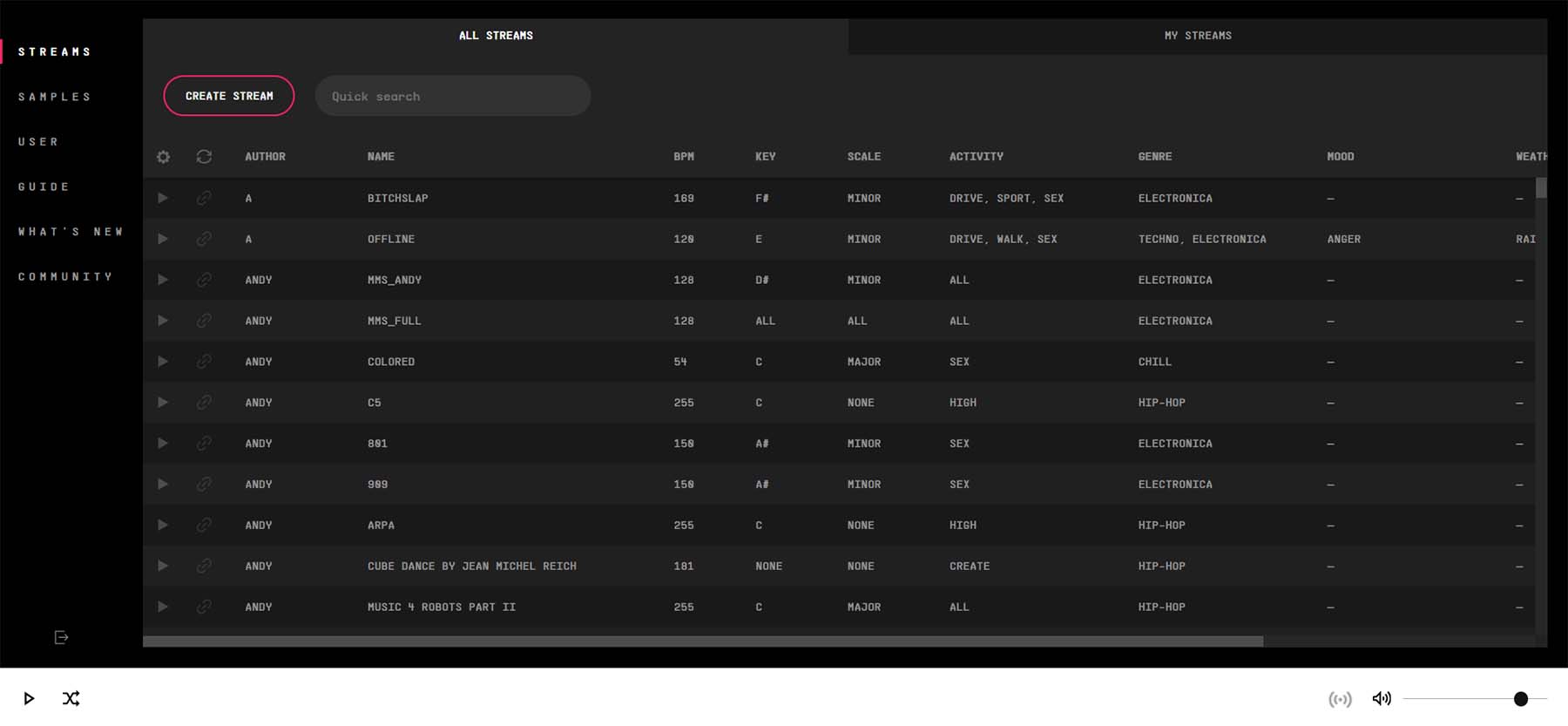
While this is a beta program of Mubert, musicians, creatives, and producers can use Mubert to make music, and Mubert will use its platform and AI to share this music with those who want to support creatives by purchasing their work. When you use Mubert Studio, you upload your stems, tracks, loops, and audio. Then, your music will be included in the Mubert ecosystem, from Render to the API to Mubert Business. Mubert will then pay out 80% of track sales to the creative, a far cry from what many streaming platforms pay musicians.
Protects Businesses from Legal Issues
As a business, you can safeguard and reduce your legal issues when playing music by subscribing to Mubert.
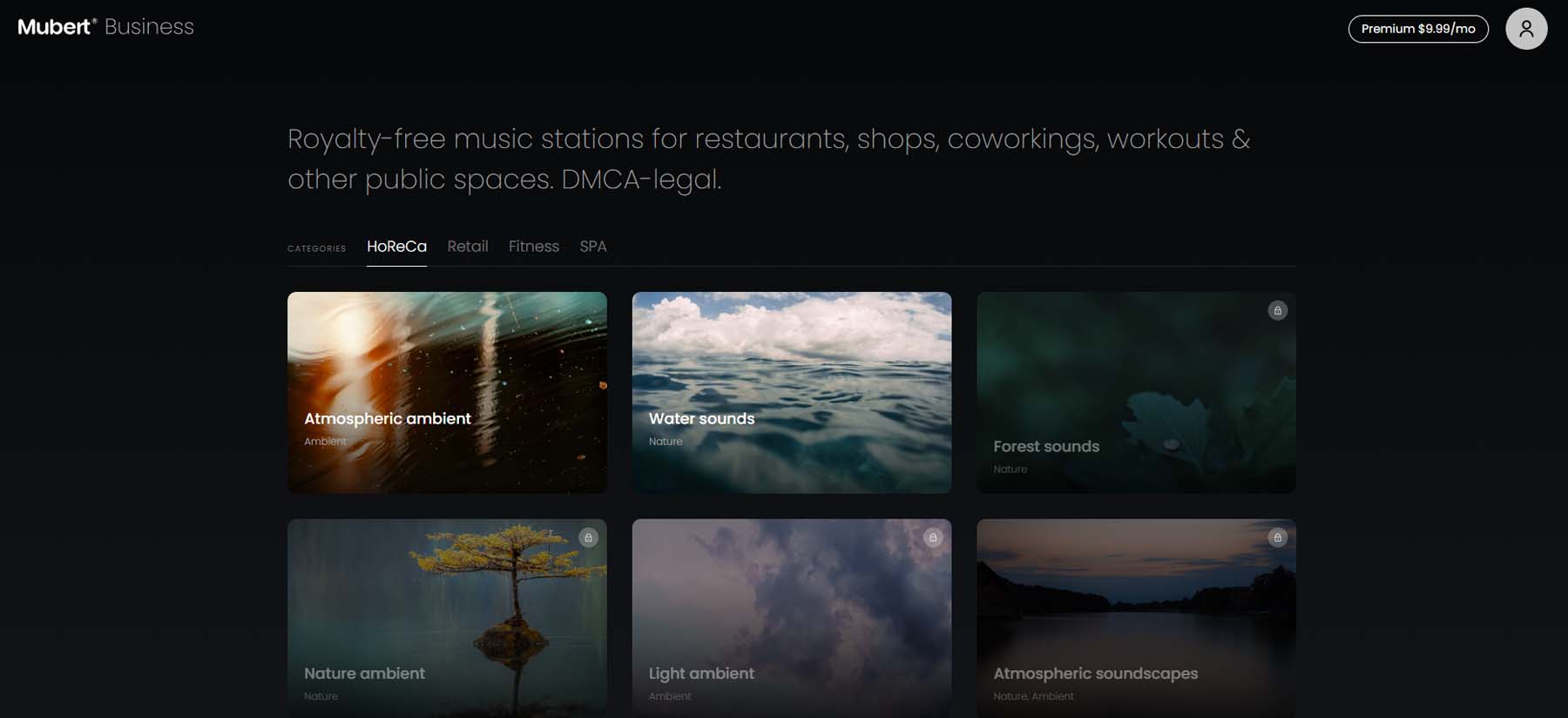
Powered by 40 live music stations, get a 24/7 stream of safe, AI-powered music for your business or space, securing yourself against legal battles and infringements. Mubert takes care of all necessary music licensing and royalty payments on your behalf. This ensures full compliance with copyright laws, sparing you the burden of tracking down licenses and handling complex legal matters.
Now that we’ve looked at what makes Mubert so unique, let’s take it for a test drive and create some music.
How to Generate AI Music with Mubert Render
Mubert Render is an online tool that allows you to enter prompts, set track duration, and more to create AI generative music in seconds. Let’s begin!
1. Visit the Mubert Website and Sign Up for an Account
Visit mubert.com. From the homepage, click the Sign Up text link. from the navigation.
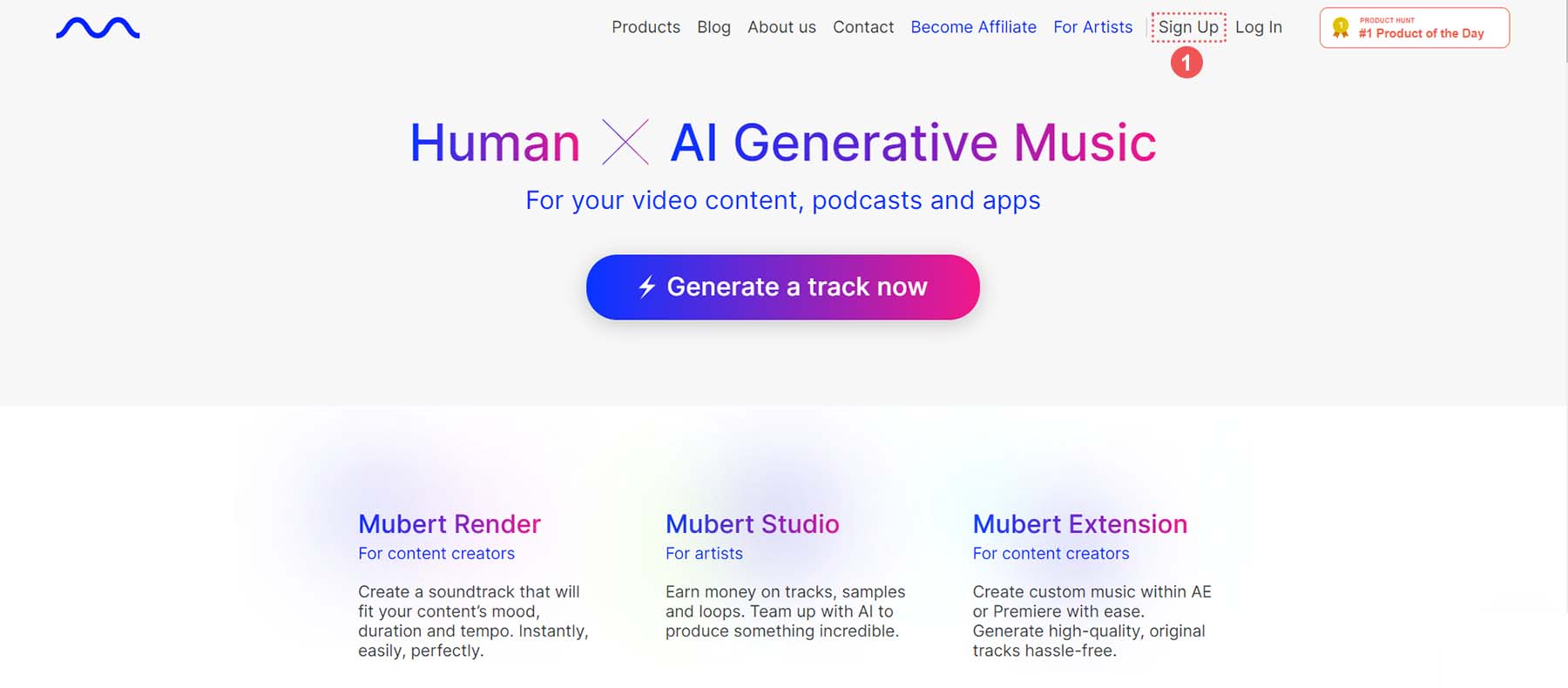
Next, enter your email address and a password. Alternatively, you can use Google or Facebook to create your account. Once you’ve entered your details, click Create Account.
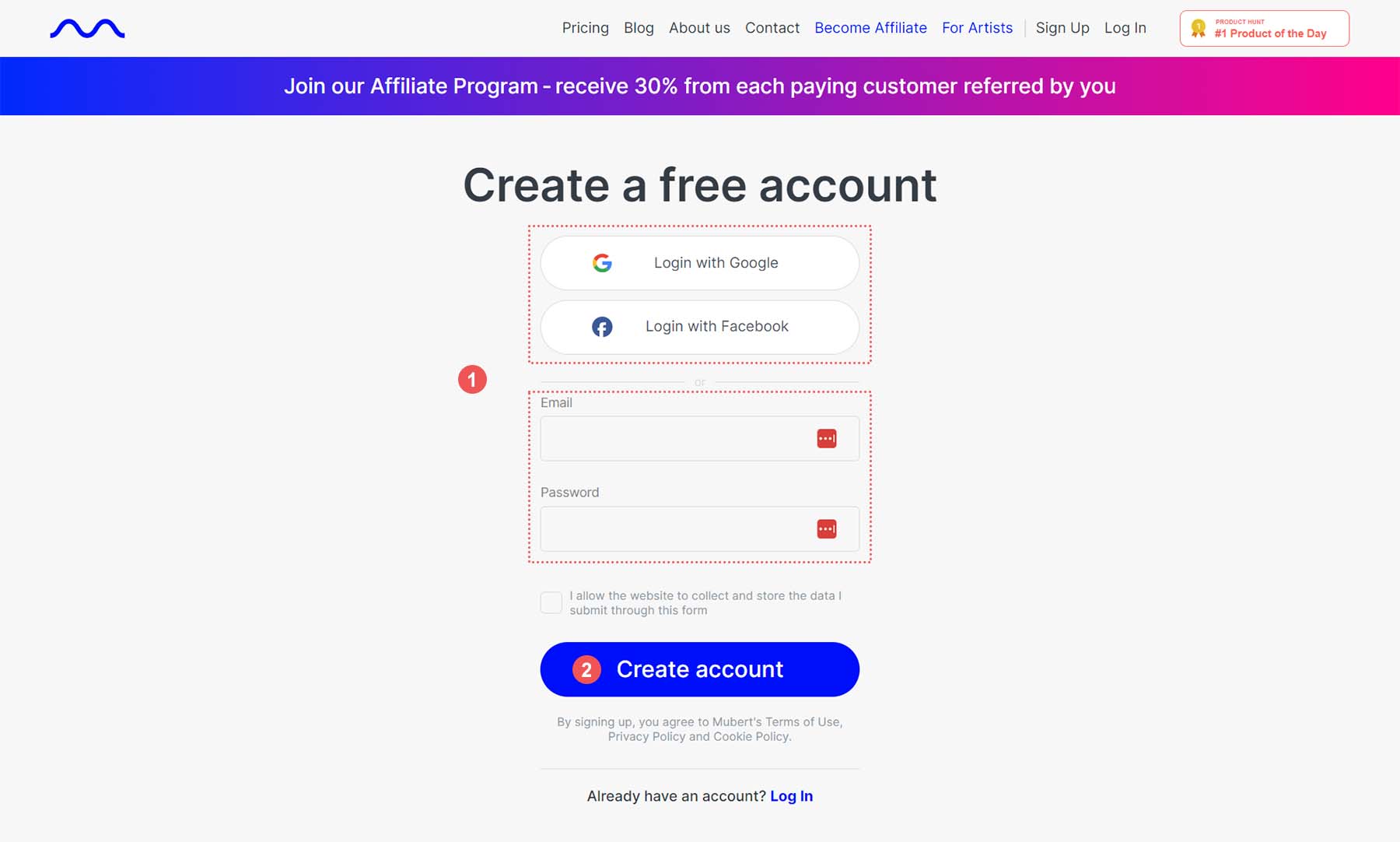
You’ll receive an email asking you to confirm your account with a code. Copy and paste that code, and click the authentication link within that email.
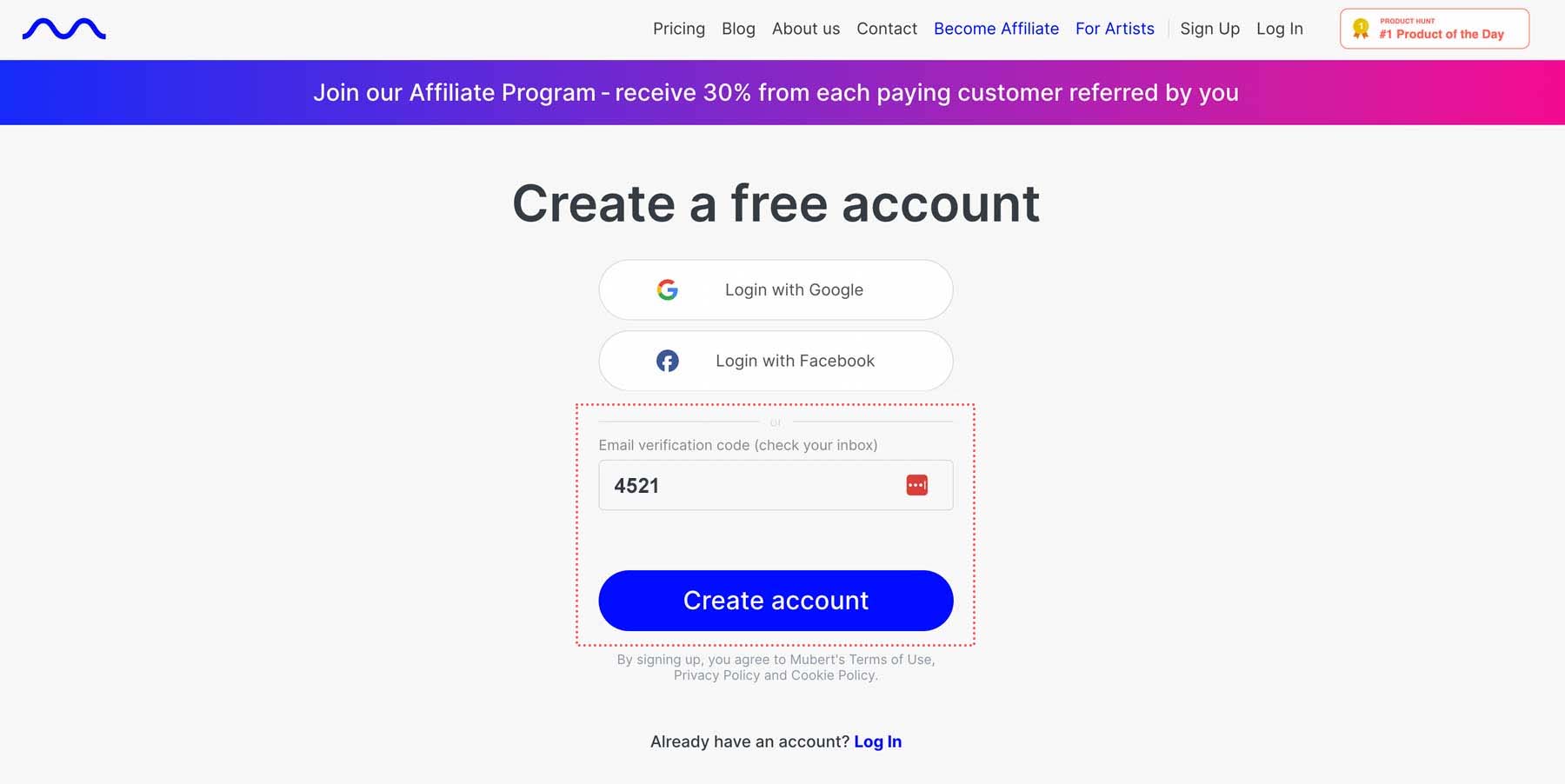
Next, paste the code into the Mubert email verification system. Click the blue Create Account button. With your new Mubert account, any music you generate will be saved and stored for later use, download, and work within the Mubert suite of tools. Now, let’s create some music!
2. Create Your First Audio Track with Mubert
To make your first AI audio track, enter a prompt into Mubert. For example, we entered as a prompt: create an 80s-inspired vaporware track that’s upbeat.

Then, you set the duration of the track. Finally, click the Generate Track button. If you choose a genre, mood, or activity, it’ll auto-populate the prompt textbox for you. However, you won’t be able to customize your prompt further. It’s advisable to use these as guidelines and keywords to add to your prompt.

Depending on the length of your track, it could take anywhere from a couple of seconds to several minutes for Mubert to generate your track. Once your track has been completed, you will be able to download the track and do much more:
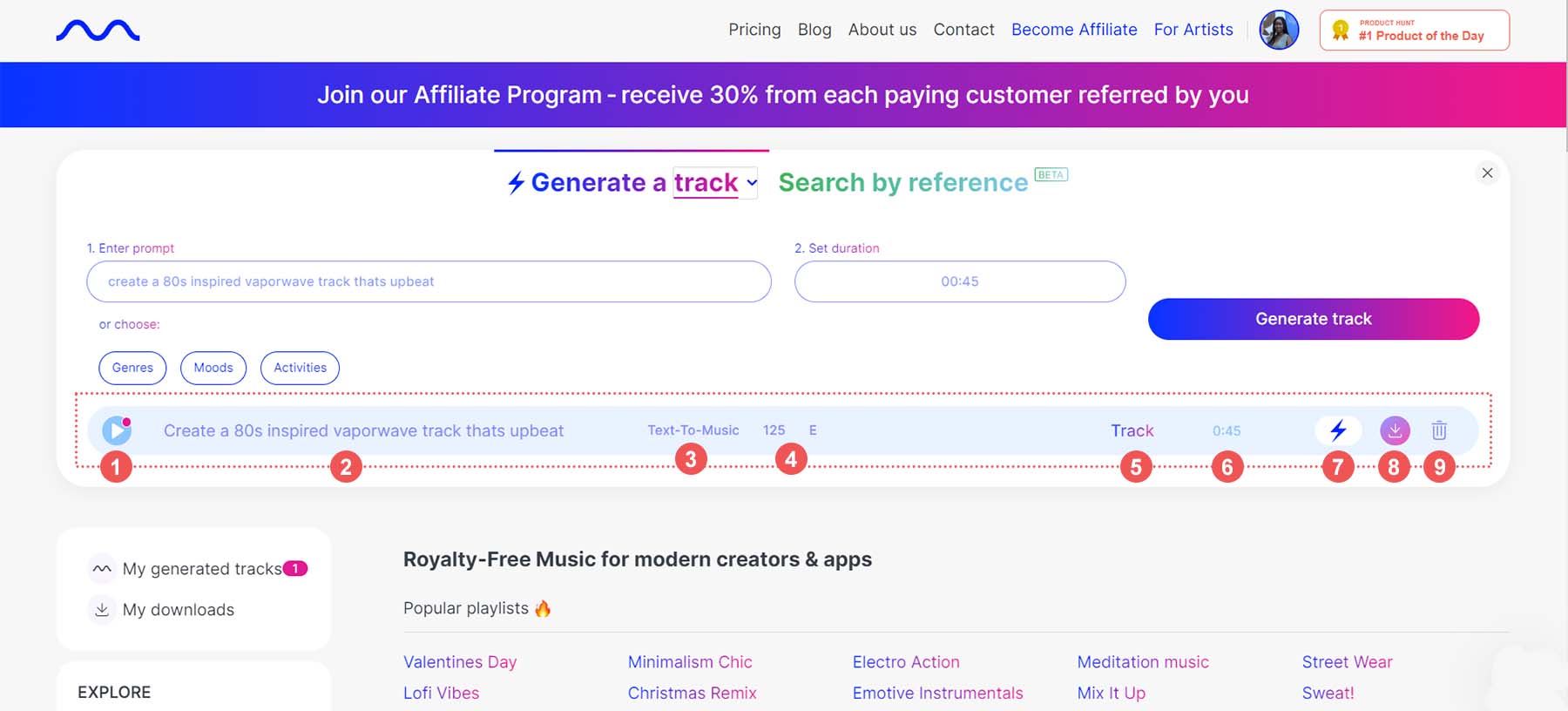
- This allows you to play your trackback
- Your prompt becomes the filename of your track
- The method that you used to create your track is added
- The beats per minute (BPM) and key of the track
- The type of audio you created. Mubert allows you to create four different kinds of audio files with AI
- The duration of your track
- Generate a similar track based on the current track
- Download your track and
- Delete your audio file
You’ll also notice that you can see a notification next to the Generated Tracks menu title on the lower left-hand side.
4. Download Your Audio File
When a track is generated in Mubert, it needs to be added and processed as a downloadable MP3 file before you can use your work. To download your audio file, click the Download icon on your track.
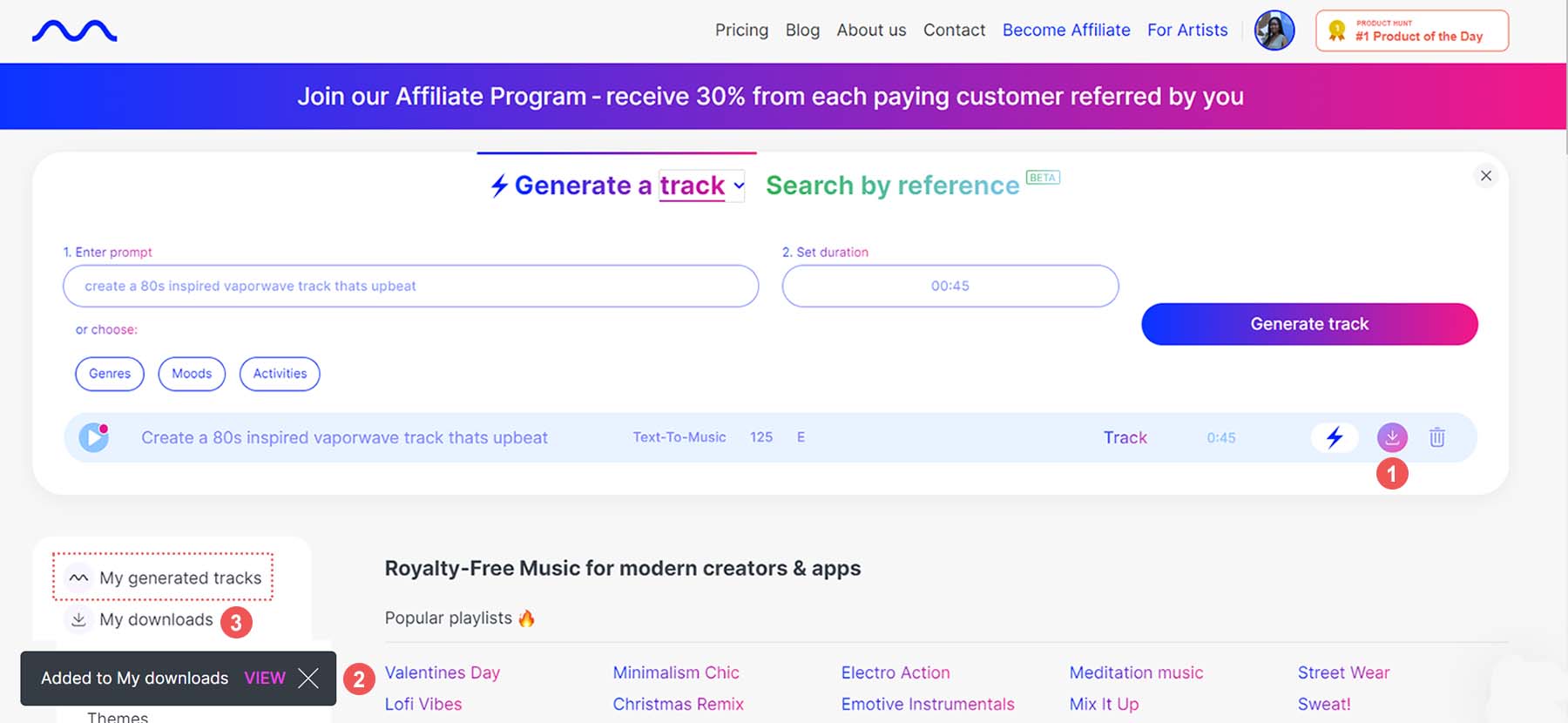
You’ll notice a popup that says your file has been added to My Downloads, and the alert next to My Generated Tracks has disappeared. Next, click My Downloads.
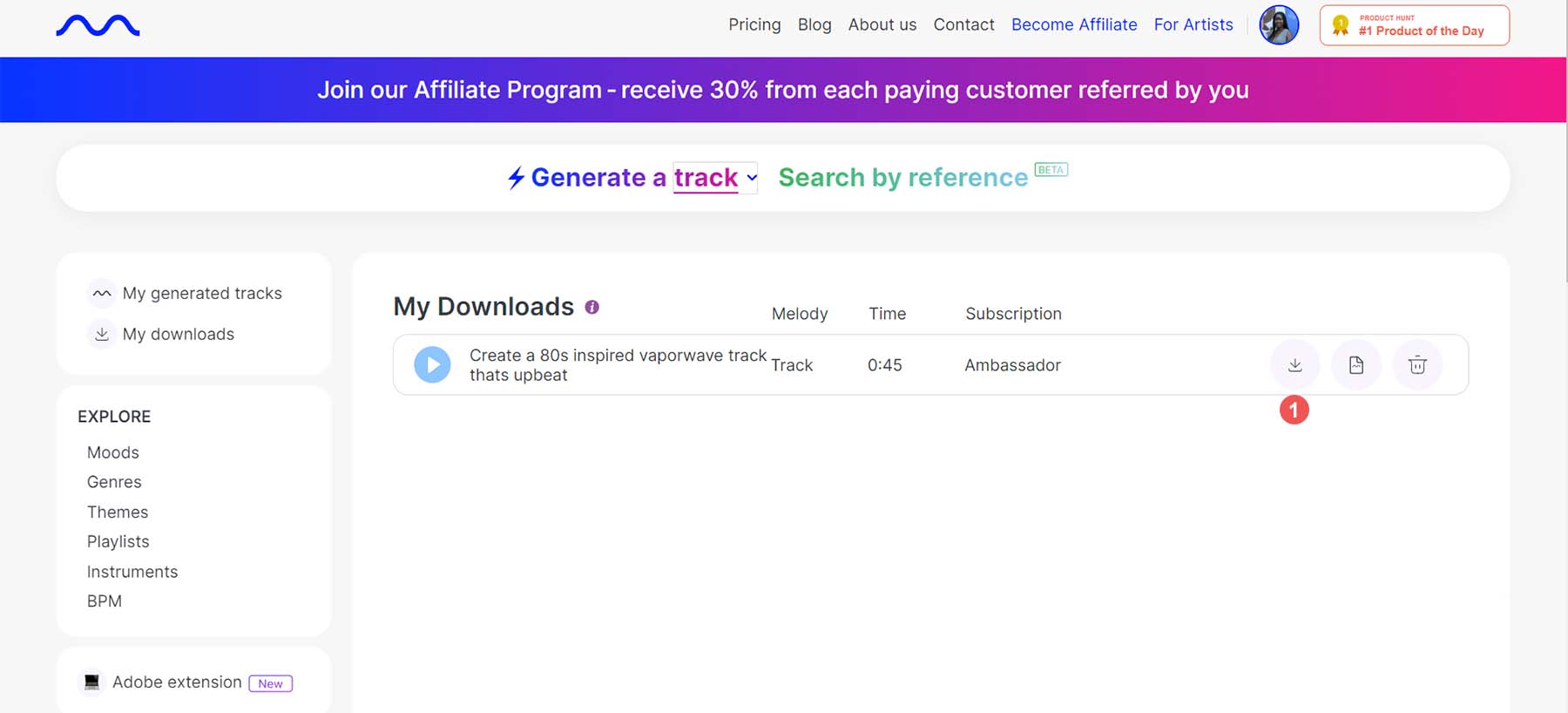
Here, you’ll now be able to download your track finally. Additionally, you get a PDF that acts as a license for you to use your music as per your license agreement and subscription level. Finally, click the blue Agree and Download button to download your file to your hard drive.
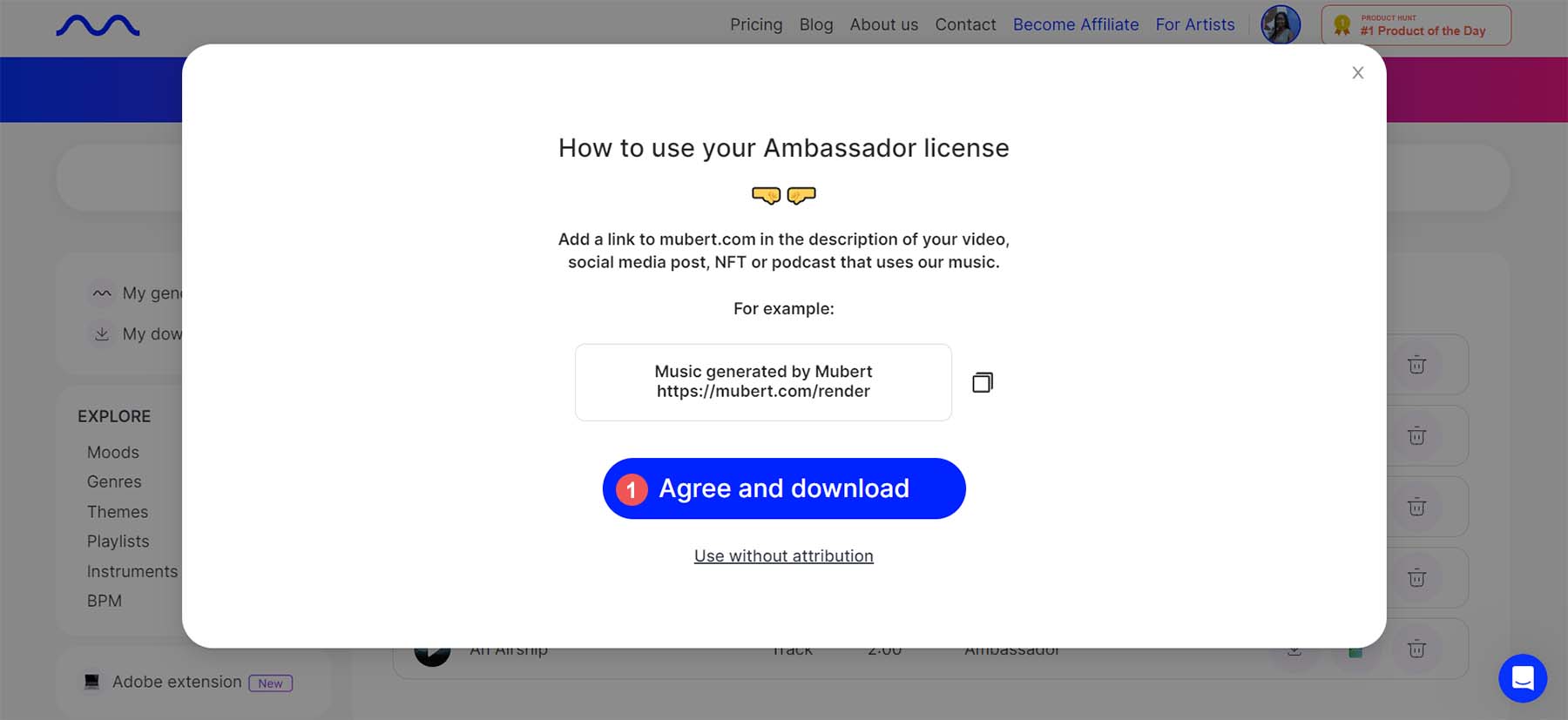
This is what our final track sounds like:
Nary, an instrument, producer, or vocalist, was used to create this audio file—simply some text inputs and the power of Mubert’s artificial intelligence.
Mubert AI Pros and Cons
Overall, Mubert does fill in the gaps for non-musicians. Its ease of use empowers anyone to make music. It produces high-quality music that can be utilized for free or for a nominal fee by those new to creating content or music production. Mubert’s easy-to-understand interface also makes it an excellent tool for those new to content creation as a creator or musician. While Mubert AI has many tools in its arsenal and makes creating music with AI easy and accessible to the masses, it does have some shortcomings. For starters, the music it creates does not have traditional music’s complexity. While the music it creates is of premium quality, even within its free version, to the trained ear, it can fall flat.
Mubert doesn’t yet understand the nuances within music, especially when dealing with genres that may be up and coming. It can generate unique pop, classical, and jazz pieces but struggles when creating music from around the globe or musical genres that may be considered underground. Nevertheless, Mubert AI is a great starting point for those new to AI music creation and those who want to create and consume music more ethically.
Mubert Pricing
Mubert’s pricing structure allows you to choose between a subscription or a single track purchase.
Subscription Pricing
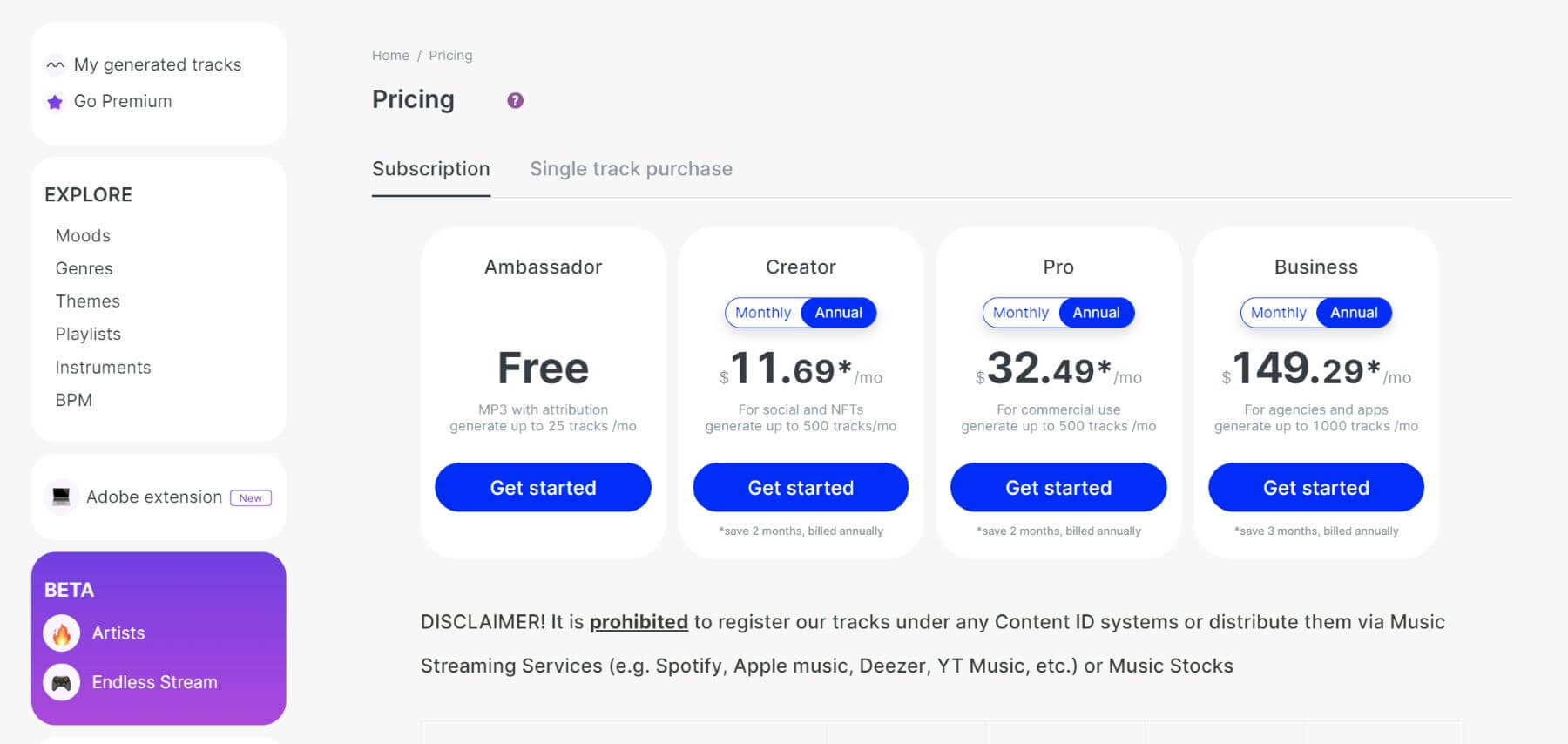
Muber currently offers four subscription plans. If you’re a small, non-monetized content creator or run a personal blog and wish to experiment with AI music, the free Ambassador plan was made for you. Remember that your final work will include an audio watermark and must provide attribution. The Creator plan at $14 per month will be ideal for content creators who desire music for their videos, social media posts, and other projects. The only caveat is certain monetization restrictions.
The Pro plan for Mubert is $39 per month. It fits indie game developers and small to medium-sized projects perfectly. With this plan, you can utilize the music you create for commercial advertisements in various formats, including radio, television, and online. Plus, you gain access to the powerful Mubert Adobe plugin. Mubert’s Business Plan is $199 per month. It is the premier choice for large-scale agencies creating projects such as movies and TV shows. This plan includes the added benefit of access to a dedicated Mubert account manager.
Comparing the Pricing Plan Features
Let’s take a look now at some of the outstanding features of each of these pricing plans.
| Ambassador | Creator | Pro | Business | |
|---|---|---|---|---|
| Monthly Price: | $0 per month | $14 per month | $39 per month | $199 per month |
| NFT Soundtracks | ✔️ | ✔️ | ✔️ | ✔️ |
| No attribution required | ❌ | ✔️ | ✔️ | ✔️ |
| No Audio Watermark | ❌ | ✔️ | ✔️ | ✔️ |
| Lossless Quality | ❌ | ✔️ | ✔️ | ✔️ |
| Monetized Social Media Posts | ❌ | ✔️ | ✔️ | ✔️ |
| Digital, Radio, Online etc. Ads | ❌ | ❌ | ✔️ | ✔️ |
| Use in Client Projects | ❌ | ❌ | For Freelancers | For Agencies |
| In-Game Music | ❌ | ❌ | Indie | Major |
| In-App Music | ❌ | ❌ | ❌ | ✔️ |
| Access to Adobe Plugin | ❌ | ❌ | ✔️ | ✔️ |
| Access to an Account Manager | ❌ | ❌ | ❌ | ✔️ |
| Access to Mubert API | Contact Mubert Directly | |||
| Best For: | Hobbyists | Content Creators | Freelancers | Agencies |
| Visit | Visit | Visit | Visit | |
Regardless of your plan, you can integrate with the Mubert API but must contact Mubert directly for access.
Single Track Purchase Pricing
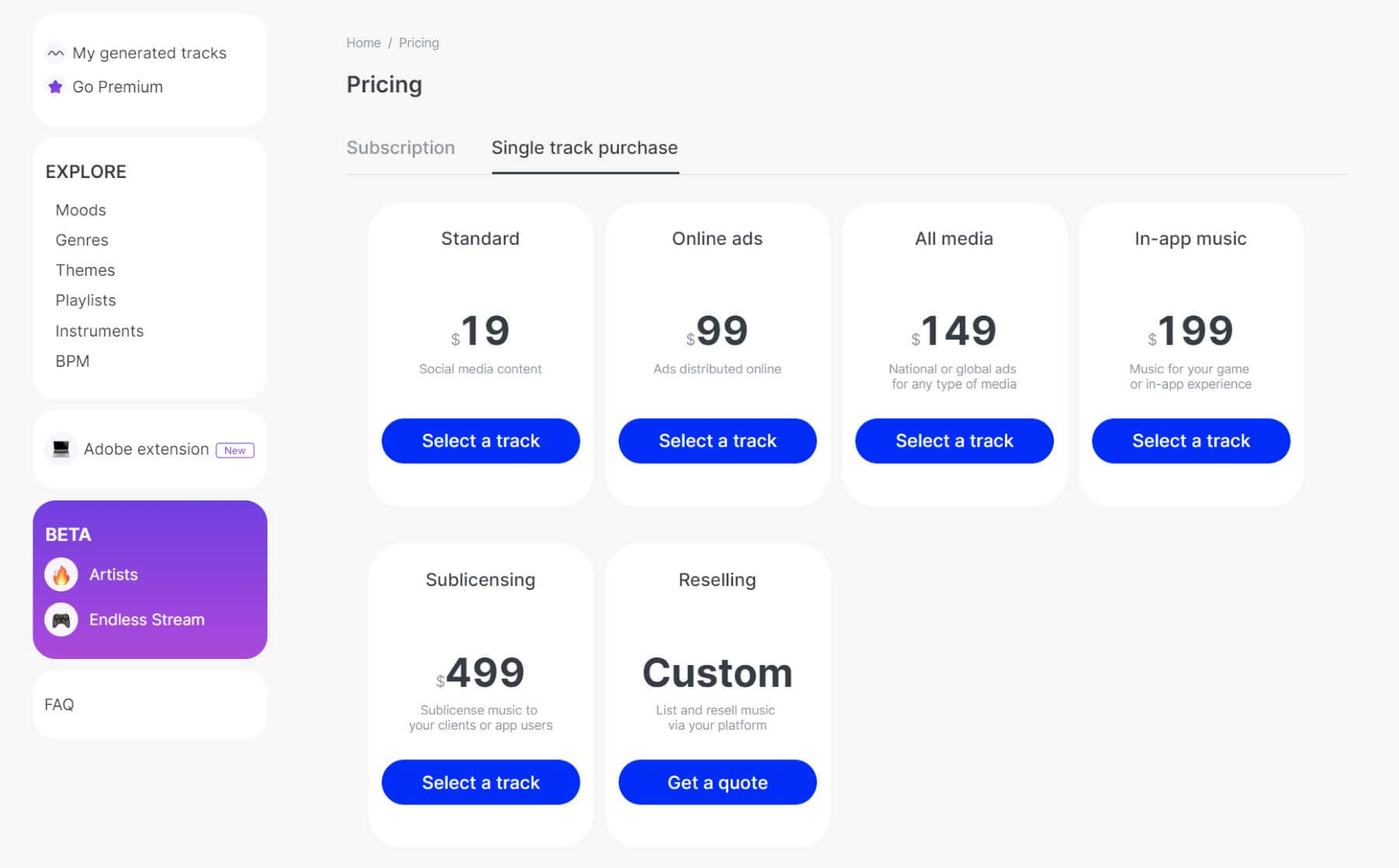
If you want to purchase a single track instead of signing up for a subscription, Mubert offers five options, with the prices varying according to usage and licensing.
For example, purchasing a Standard track will cost $19 and can be used for social media and monetized blog posts.
But you’ll need to purchase a track with the Online Ads option for $99 if you want to use your music on digital ads, including YouTube.
To purchase a track for All Media, including TV, radio, etc., it will cost you $149.
An In-app Music track will cost $199.
And if you want to purchase a track for sublicensing, it will cost $499. If you want to get into reselling, you’ll have to reach out for a quote.
In Conclusion
When it comes to creating music with AI, Mubert is a top contender. Its online platform and fully functional API are worthwhile considerations for crafting creative, AI-powered music. Unlike other audio AI generators, Mubert AI brings a unique blend of sophistication and simplicity to the music creation process. Whether you want to create a loop for your TikTok quickly or need a music score for your indie film, use Mubert to bridge the gap between human creativity and the power of AI in the arts.
If you’re interested in expanding your knowledge of music and artificial intelligence, explore our other informative AI articles:

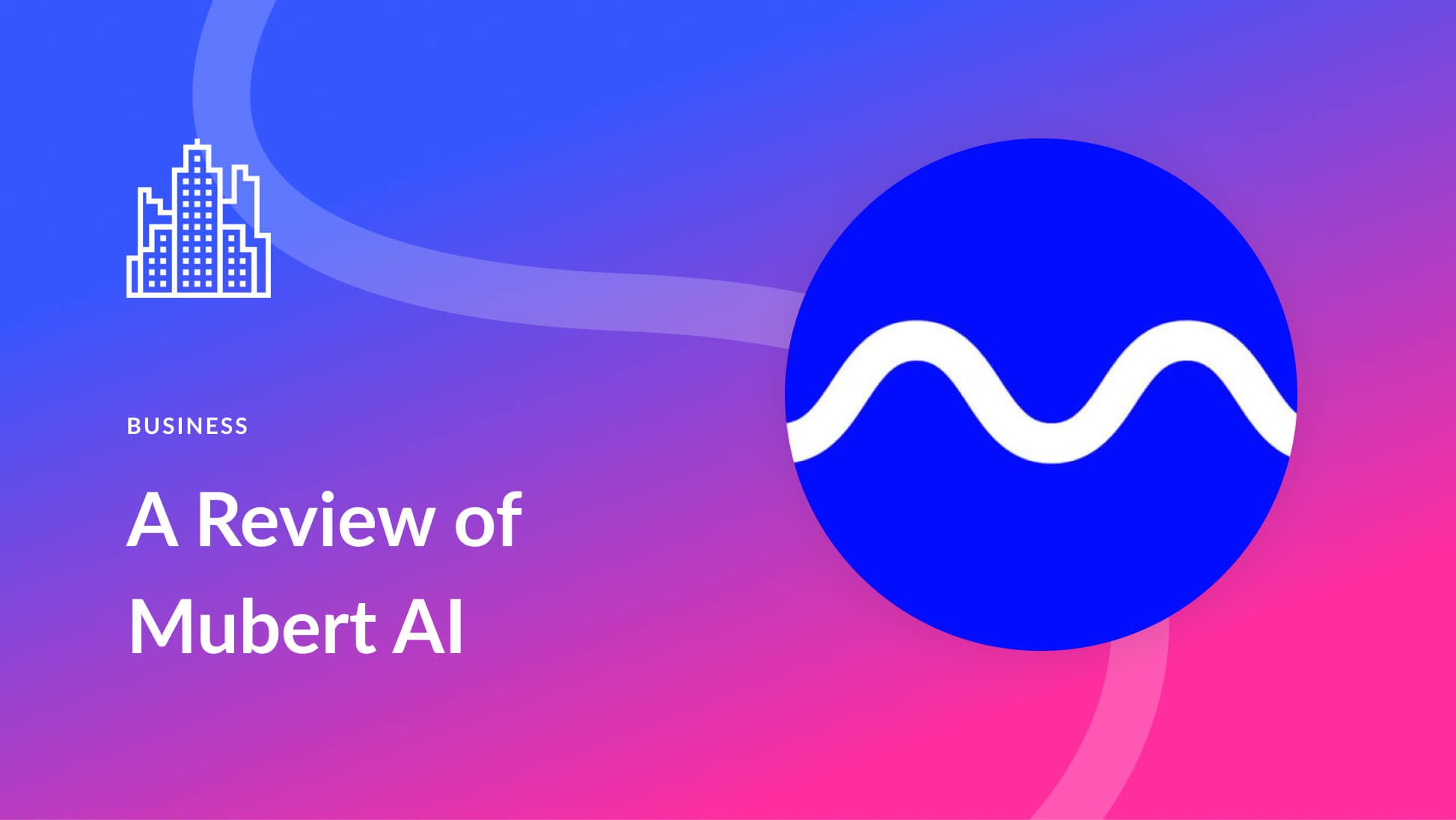
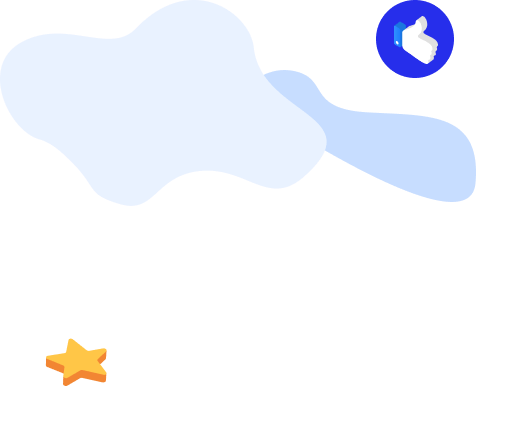


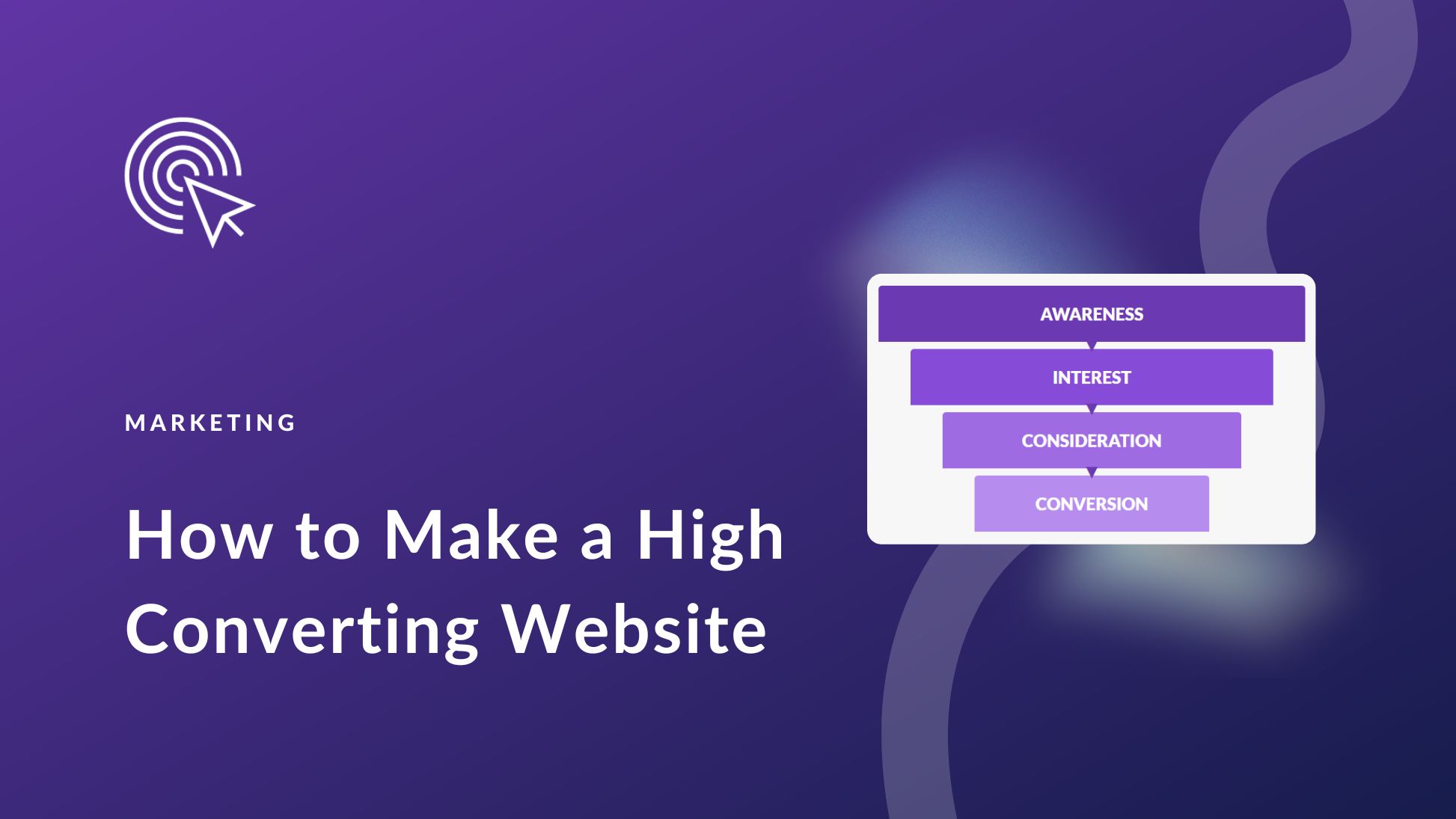
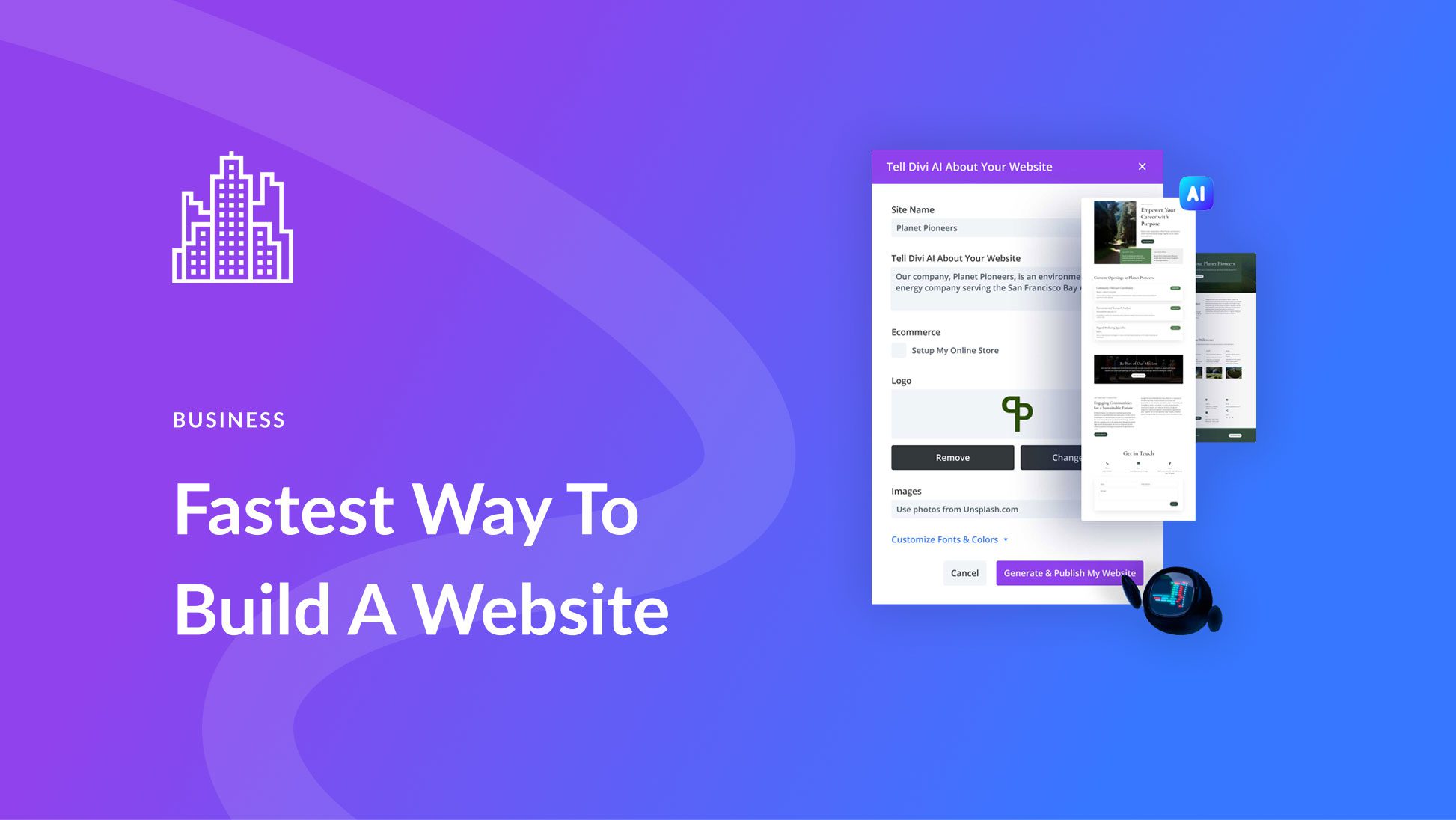
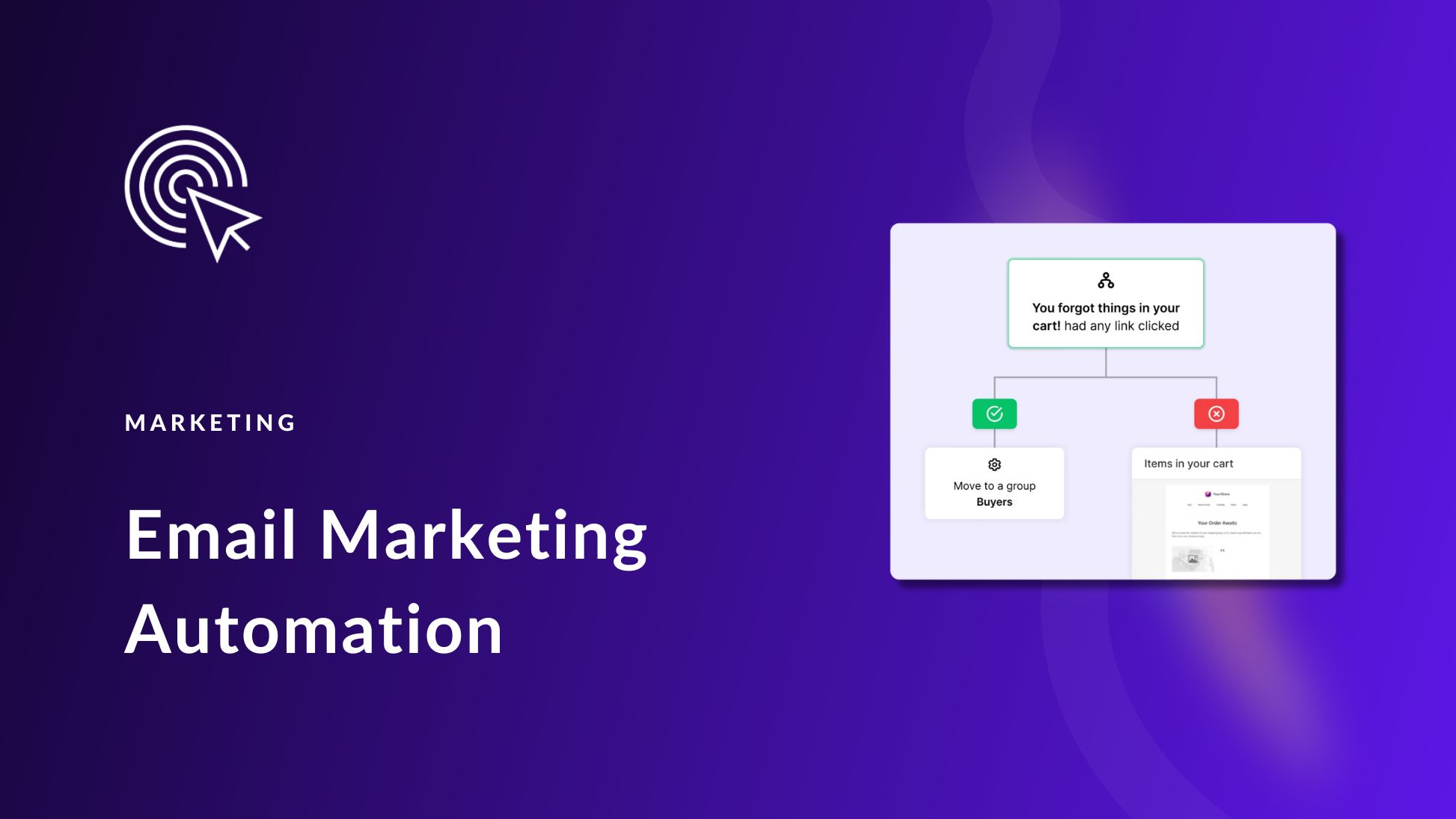
Great overview! One of the reasons I sub this blog is that Elegant Themes does a great job of keeping an eye out for new things that are important. As a musician, I’m pretty sure that the reaction in the music creation community to this site is going to be panic, alarm, and hand-wringing, but I have a different take. I’m fairly encouraged by the samples included on this page.
When GarageBand first shipped, with tons of audio and MIDI loops that you could use to easily make your own songs, people panicked. But in retrospect, the loops in GB didn’t really put any kind of dent in the Music Business. GarageBand, on the other hand, did – it was the first DAW that many people used, and many then graduated to better DAWs. The fact that AI can now randomly generate the modern equivalent of Muzak shouldn’t surprise anyone, and the only people threatened will be the folks who make bad background music – they’re going to need to up their game, but that’s not a bad thing.
Is there a danger that one day AI will be able to write songs/TV scripts/etc better than humans? I think that AI will eventually be able to generate content that is more popular than human writers/artists, but it won’t be “better.” The most popular hamburger in the world is McDonalds, and no one would claim it’s the best.